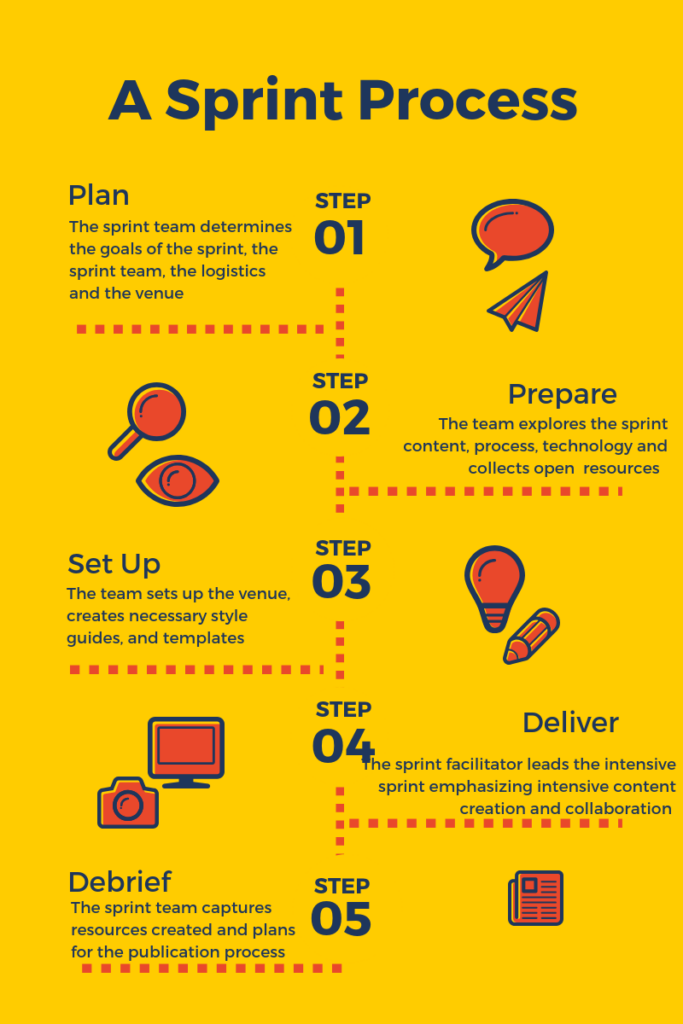Strategies & Steps for Growing OER Initiatives
The previous sections highlighted the reasons why sharing and working openly is beneficial to all stakeholders in educational institutions and explored initiatives undertaken by level of engagement. This section will provide some resources to assist in supporting and growing open initiatives at your institution, by level of engagement. The intention is to provide a variety of resources and tools to fit each institution based on where they are at in their open education journey.
 Individual Level
Individual Level
If you are interested in becoming an OER champion at your institution, your first step could be to engage in open communities and learn from others. Below is a list of networks and newsletters that are available to learn more.
Ontario
- eCampus Ontario Open Communities (available to Ontario educators)
- eCampus Ontario Open Library Network (OOLN)
Canada
- BC Open Education Librarians OEL
- Réseau-REL (French-language listserv)
Global
- Community College Consortium for OER CCCOER Google Group
- Creative Commons Open Education Platform CCOpenEdu
- Global OER Graduate Network (GO-GN.net) Group
- OER Commons
- Open Education Community
- Open Education Group
- Open Education Network Community
- SPARC – OE Forum (the Scholarly Publishing and Academic Resources Coalition)
Job Postings
It can be challenging to justify the funding need for open work support roles with many competing priorities for institutional funding. Administrators may feel that it is an easier sell to secure funding for a permanent position after a pilot period in which to demonstrate impact. A temporary position frees up time for other library faculty and staff who had been adding OER to their plates in addition to their regular work. Consider this post on Advice on one-year OER Librarian Positions for guidance on temporary positions. The post also includes a list of ideas of action items to try when taking on an OER support role.
Sample Job Postings
 Institutional Group Level
Institutional Group Level
If your institution is interested in supporting a community of practice or working group, the following resources may be helpful.
Open working groups are a great way to conduct advocacy and build momentum for open education in an institution. They bring together the people on campus that are interested in or already engaged in open educational practices (OEP). These groups are oriented towards tasks for a certain length of time. Some may revolve around a project like developing an Open Educational Resource (OER) strategy, and others may include cross-functional members in charge of distributing OER grants.
The links below provide information to help you establish a new open working group, formalize a current one, or refresh/restart one that has been struggling. Also included are some examples of working groups and research about working groups and communities of practice.
- Working Group Guide — Establishing a Working Group
- Ontario Open Library Network OER Working Group Templates
- Western University’s Open Education Working Group Charter
- The Rebus Guide to Publishing Open Textbooks (So Far) provides a whole section on building a team and project scoping to assist you in your open project.
Sprints
 A Sprint Process by Krista Lambert and Lucas Wright BCcampus. Licensed under CC-BY 4.0. Click on the image to enlarge.
A Sprint Process by Krista Lambert and Lucas Wright BCcampus. Licensed under CC-BY 4.0. Click on the image to enlarge.
Long Description
A Sprint Process
Step 01: Plan
The sprint team determines the goals of the sprint, the sprint team, the logistics, and the venue
Step 02: Prepare
The team explores the sprint content, proccess, technology and collects open resources
Step 03: Step Up
The team sets up the venue, creates necessary style guides, and template
Step 04: Deliver
The sprint facilitator leads the intensive sprint emphasizing intensive content creation and collaboration
Step 05: Debrief
The sprint team captures resources created and plans for the publication process
The concept of a sprint comes from software design and is becoming increasingly used as a strategy or approach for developing OER. The sprint approach can be used in a variety of contexts where a group of people (often cross-disciplinary) come together to focus on a specific project. In higher education, sprints are emerging as a way to accomplish a shared goal while working across disciplines and on a short timeline. Hackathons can follow a similar process — but often have a competitive element.
The sprint methodology involves the following features:
- short timelines and achievable goals;
- time-boxed working sessions (usually two to three days, but can vary according to context and needs);
- a defined outcome (to produce a textbook or other resource, etc.);
- a planning process to develop the sprint process;
- multiple perspectives and skill sets;
- identified/agreed roles for participants;
- collaborative — rather than competitive — development processes
Sprint Resources
Explore more information and examples of sprints by clicking on the following links:

